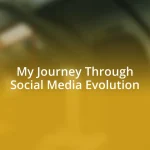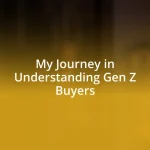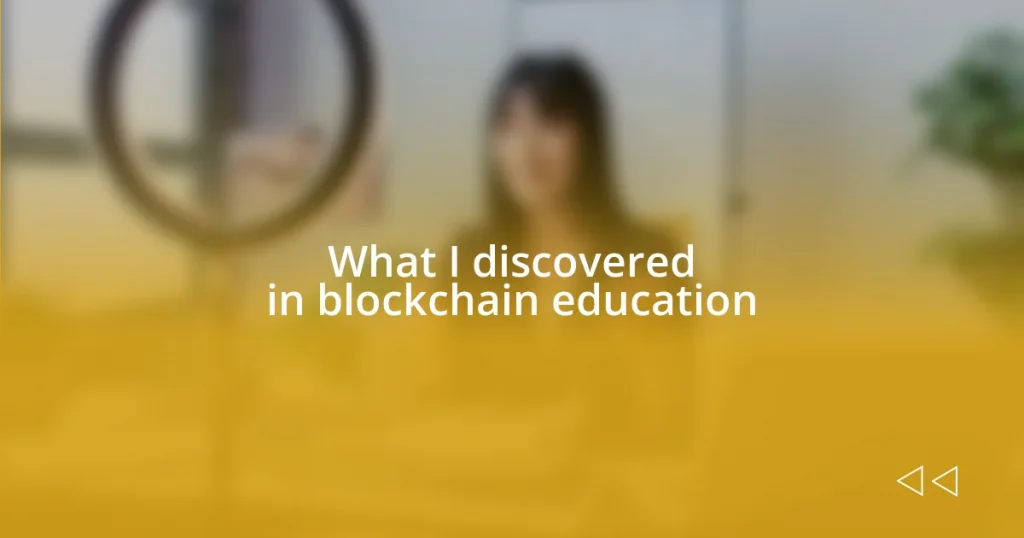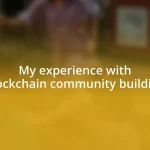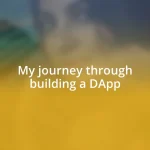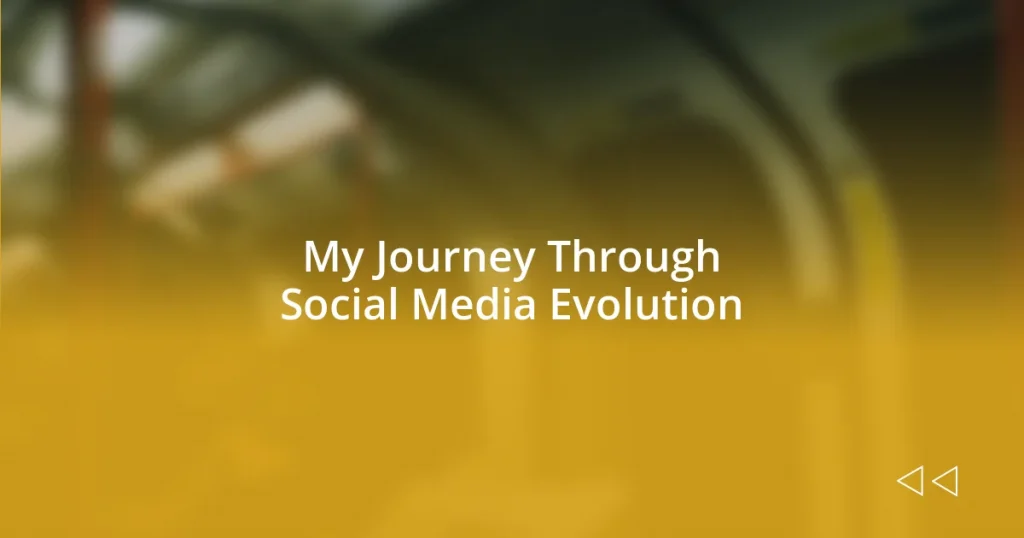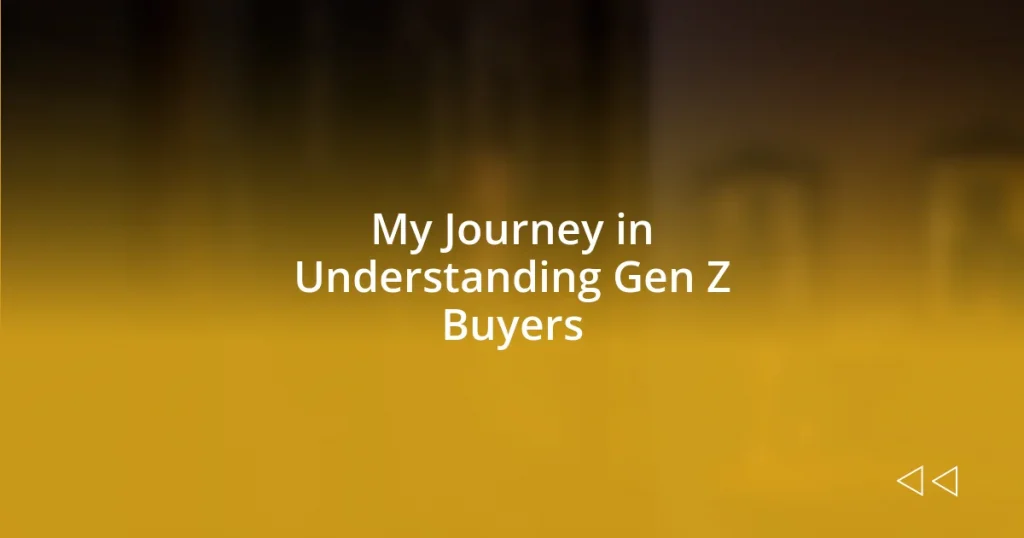Key takeaways:
- Blockchain education fosters a strong sense of community, innovation, and collaboration, enhancing learning and understanding of the technology’s applications.
- Understanding key concepts such as decentralization, smart contracts, and consensus mechanisms is essential as they significantly impact various industries and promote trust and security.
- The future of blockchain education is leaning towards gamified learning, partnerships between educational institutions and blockchain companies, and interdisciplinary approaches, enriching students’ learning experiences.
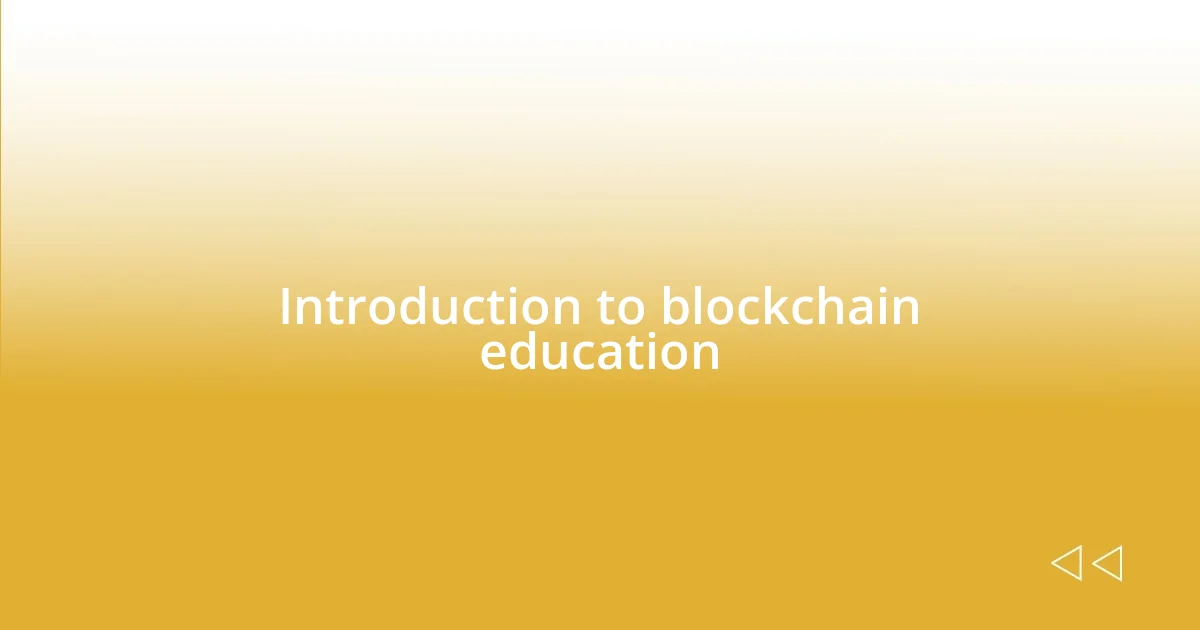
Introduction to blockchain education
When I first stumbled upon blockchain education, I remember feeling both fascinated and overwhelmed. The idea of a decentralized ledger technology seemed complex, yet there was an undeniable simplicity in its core concept. It made me wonder, how could something so ingenious revolutionize industries?
As I delved deeper, I discovered how pivotal blockchain is in fostering transparency and trust, especially in sectors like finance and supply chain. I recall attending a workshop where the instructor shared real-life applications of blockchain, like tracking the provenance of goods. It really clicked for me—suddenly, I could see the tangible benefits of this technology.
What struck me most was the sense of community within blockchain education. It’s not just about the technology; it’s about the people driving its evolution. I often find myself reflecting on how collaborative learning can spark innovation, and I can’t help but ask: how is this dynamic shaping the future leaders of the blockchain space?
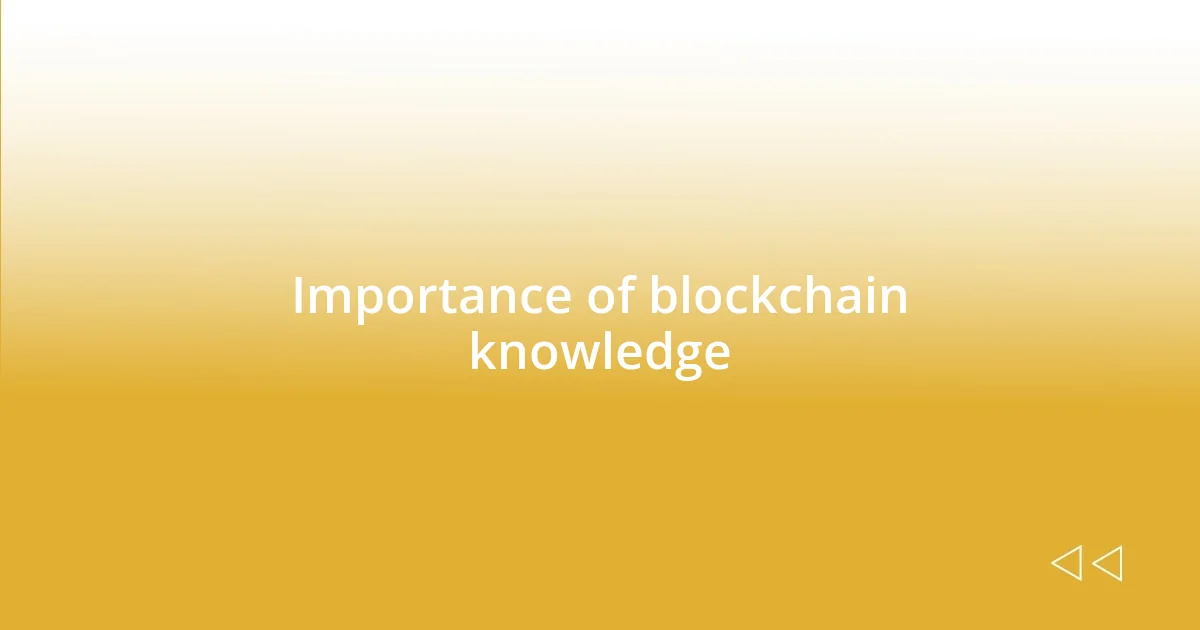
Importance of blockchain knowledge
Understanding blockchain technology is more crucial than ever in our increasingly digital world. I’ve come to appreciate that blockchain knowledge isn’t just for tech enthusiasts; it spans multiple sectors, from healthcare to finance, influencing how we think about data security and trust. I remember my first encounter with a blockchain project in healthcare, where experts illustrated how the technology could securely store patient records. It was inspiring to see how blockchain could empower individuals and enhance privacy.
Key reasons why blockchain knowledge is essential include:
- Transparency: Knowledge of blockchain illuminates how transactions are recorded transparently, reducing fraud.
- Security: With a decentralized approach, understanding blockchain helps us appreciate enhanced security features, especially for sensitive data.
- Career Opportunities: As industries evolve, a grasp of blockchain can open doors to countless career possibilities in various fields.
- Innovation: Familiarity with blockchain fuels innovation, enabling individuals to contribute to groundbreaking projects that can change industries.
The more I explore, the more I realize how vital this knowledge is in shaping our future. It’s not just about understanding technology; it’s about being part of a movement that champions accountability and empowers individuals.
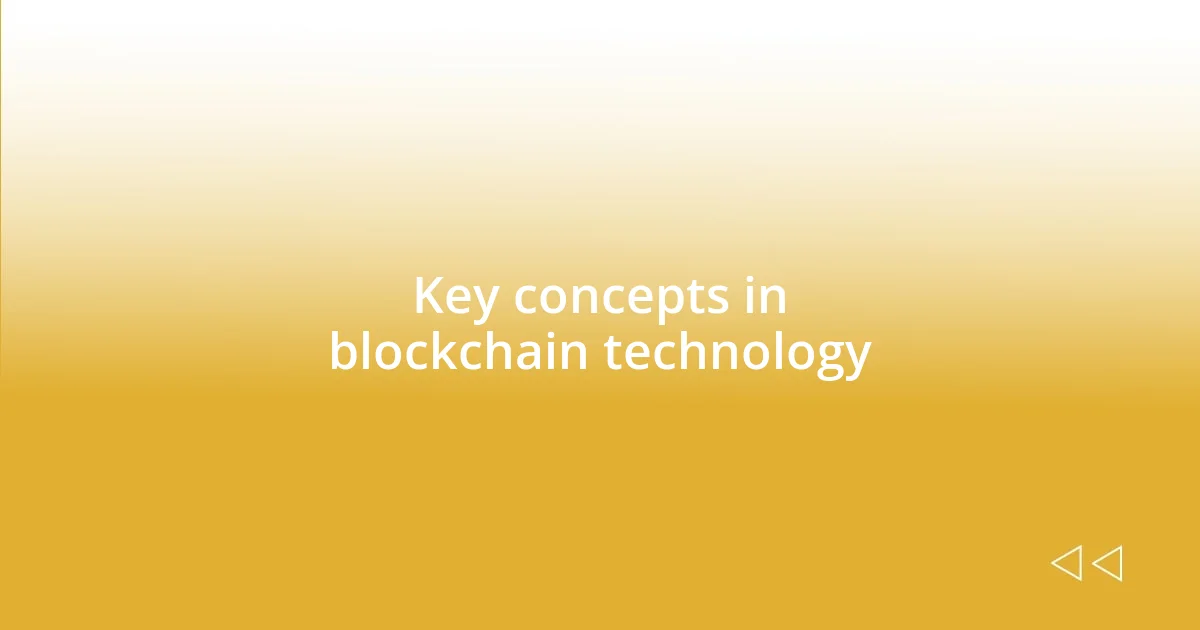
Key concepts in blockchain technology
Understanding the key concepts in blockchain technology has been quite the eye-opener for me. While initially I thought of blockchain merely as a ledger, I soon realized it’s much more than that. For instance, the concept of decentralization really resonated with me; it means no single party controls the data, which sparks a sense of empowerment and trust. I remember discussing with a friend who works in finance how this principle could completely disrupt traditional banking systems.
Smart contracts are another fascinating aspect I encountered during my studies. These are self-executing contracts with the terms directly written into code, ensuring that agreements are enforced without intermediaries. I recall a project I worked on where smart contracts streamlined payment processes in a supply chain. It was fulfilling to see how technology could not only reduce costs but also increase accountability.
Then there’s consensus mechanisms, which ensure that all participants on the blockchain agree on the validity of transactions. I found it intriguing when I learned about different types, like Proof of Work and Proof of Stake. In one discussion, I learned how Proof of Stake can be more energy-efficient than Proof of Work. This topic made me appreciate the balance between security and sustainability in blockchain discussions.
| Key Concept | Description |
|---|---|
| Decentralization | No single entity controls the data, fostering trust. |
| Smart Contracts | Self-executing contracts ensuring agreement enforcement without intermediaries. |
| Consensus Mechanisms | Protocols that ensure all participants agree on transaction validity. |
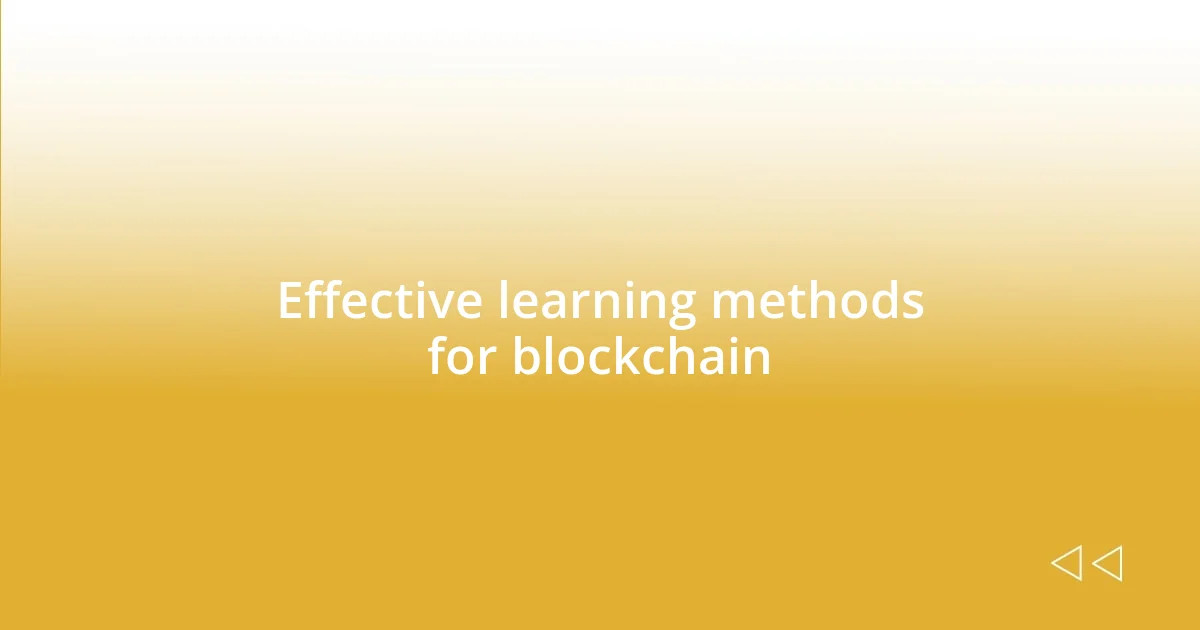
Effective learning methods for blockchain
Engaging with blockchain education can take many forms, and I’ve found that one of the most effective methods is hands-on learning. When I first started experimenting with building simple decentralized applications, it was like a light bulb went off. Suddenly, concepts I had read about became tangible. It raises the question: how can we fully understand something without experiencing it firsthand? By diving into projects, we not only grasp the technical details but also develop the confidence to innovate.
Online courses and webinars can also provide a structured path for learning about blockchain. I remember attending a webinar that broke down complex ideas into digestible segments. The presenter used real-world examples, which made the information resonate deeply with me. Did you know that participating in these interactive sessions fosters a sense of community? When I engaged in discussions with fellow learners, it sparked curiosity and motivation to explore further—an experience I highly recommend.
Additionally, joining blockchain communities has proven invaluable. I recall my first meetup, where I awkwardly mingled with enthusiasts who shared their projects. The electric atmosphere and shared passion were infectious; it ignited a desire within me to keep exploring. Isn’t it fascinating how simply being around likeminded individuals can propel our understanding? These communities provide not just knowledge but also support, playing a crucial role in our blockchain journeys.
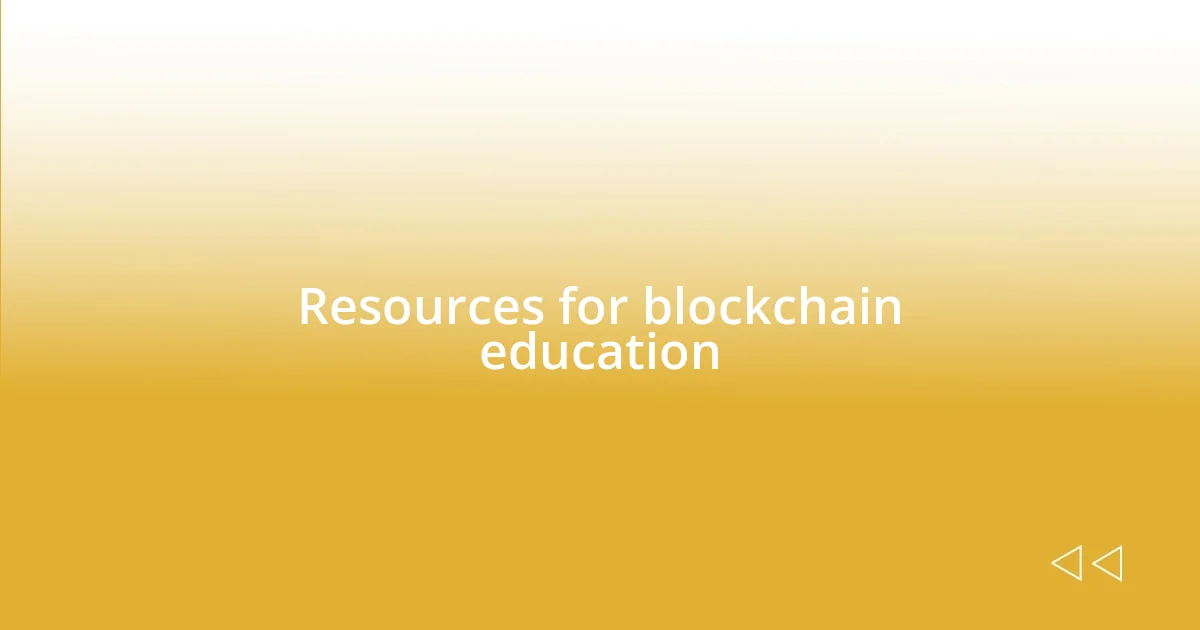
Resources for blockchain education
Identifying reliable resources for blockchain education can be overwhelming, yet it’s essential to navigate this journey effectively. I vividly recall frantically searching online and stumbling upon platforms like Coursera and edX, which offer comprehensive courses led by industry experts. These platforms not only provide structured content but also allow you to learn at your own pace—what a relief it was to find that flexibility!
Another resource I found particularly beneficial is GitHub. While diving into various projects, I discovered tons of open-source repositories where developers share their code. I remember feeling a surge of excitement when I contributed to a small project; it was rewarding to see my changes live. Have you ever felt that thrill of contributing to something greater than yourself? That sense of community and collaboration is unparalleled in the blockchain space.
Books are also invaluable. I’ve lost track of how many times I’ve turned to titles like “Mastering Bitcoin” and “The Basics of Bitcoins and Blockchains.” The insights these books provide are incredible, especially when it comes to demystifying intricate concepts. I fondly remember curling up with one on a rainy afternoon, absorbing knowledge like a sponge—it’s incredible how one good book can reshape your understanding of a technology. What resources have you tapped into that left a lasting impact on your blockchain education journey?
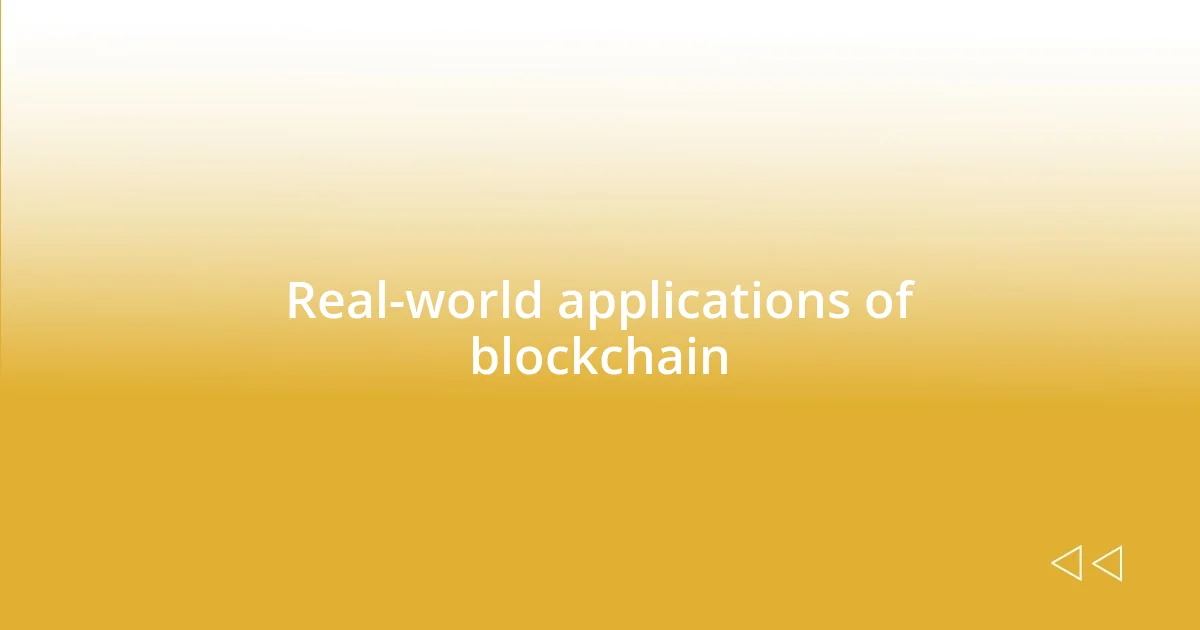
Real-world applications of blockchain
One of the most striking real-world applications of blockchain I’ve encountered is in supply chain management. I once explored a case study where a company used blockchain to track the origin of its products, ensuring transparency from farm to table. It was eye-opening to realize how consumer trust can be built through a technology that proves authenticity—wouldn’t it be reassuring to know exactly where your food comes from?
Another fascinating application is in the realm of finance, especially with the rise of decentralized finance (DeFi). I was particularly intrigued by the concept of smart contracts, which automate transactions without intermediaries. Imagine being able to lend or borrow money with an agreement that self-executes when conditions are met, freeing us from cumbersome traditional banking methods. Hasn’t the idea of making financial transactions more efficient always been something we dreamed about?
Furthermore, the potential for blockchain in identity verification is something that gets me excited. I remember reading about a pilot project in which individuals could store their personal information securely on a blockchain, enabling them to control access to their data. This not only enhances privacy but also reduces the risk of identity theft. Isn’t it refreshing to think that a technology can empower us to reclaim our personal information in such a world where data breaches seem all too common?
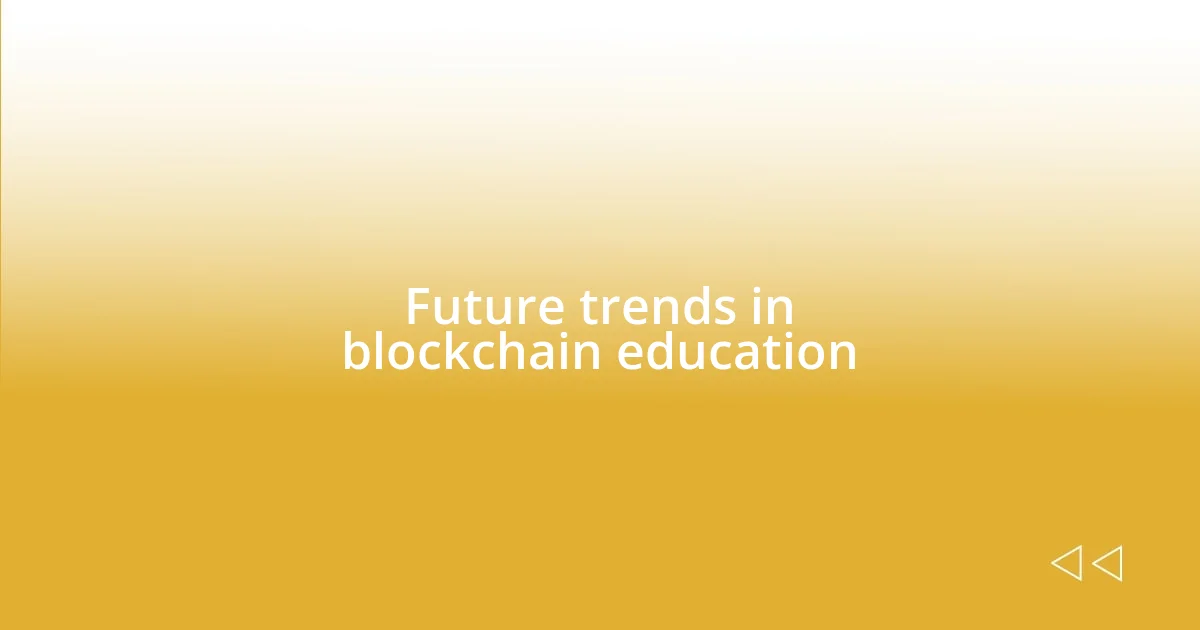
Future trends in blockchain education
One emerging trend I’ve noticed in blockchain education is the shift toward gamified learning experiences. I recently participated in an interactive blockchain simulation game, where players could test their knowledge in a fun and engaging way. It was fascinating to see how gamification not only makes learning enjoyable but also reinforces complex concepts, like consensus mechanisms. Have you ever wished that studying felt more like play than a chore?
Another trend gaining traction is the collaboration between educational institutions and blockchain companies. I remember when my alma mater announced a partnership with a well-known crypto startup to create specialized courses. This synergy offers students hands-on experience and insights directly from the field. Isn’t it inspiring to think about how real-world applications can enrich academic learning?
Finally, I see a growing emphasis on interdisciplinary approaches in blockchain curricula. The integration of blockchain with fields like law, healthcare, and environmental science excites me. I recall attending a webinar that showcased how blockchain could revolutionize medical records. It made me realize the far-reaching potential of this technology beyond traditional boundaries. Isn’t it uplifting to think about how a single innovation can create solutions across multiple sectors?

